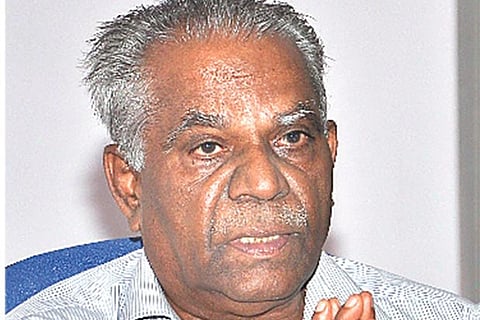

Chennai
‘War-footing’ is the word one hears when major disasters are to be managed. This term describes “the condition or status of a military force or other organisation when operating under a state of war or as if a state of war existed”. Does it even remotely relate to what is on the ground in Chennai to manage the ‘disaster’ caused by weeks of downpour? The answer is an emphatic ‘no’. And this concerns decentralised governance which is the essence of democracy. In Tamil Nadu, excessive rain has brought about a ‘disaster situation’ putting the lives and livelihoods of thousands of citizens in peril. Vast areas of metropolitan Chennai have become sheets of water, most of it virtual sewage.
Why did this happen? Firstly, the organisations responsible were not in a state of readiness to act. During the initial hours, the safety of the citizens was critically affected. There was no systematic rescue operation or emergency mobilisation to rescue the marooned victims. There were only patchy and disjointed efforts put in mostly by volunteers and some officials. Even the limited relief efforts were only targeted at the physical side of the victims like moving them to ‘relief centres’, providing food packets, clothings etc. No attention was given to the emotional and psychological side of the victims most of whom were traumatised by the devastation and humiliated by the ‘alms-giving’ attitude of the relief workers and officials.
Being used to the colonial mindset of the ‘public as mendicants and petitioners’, Government officials found it difficult to seek out the victims and offer spontaneous relief/assistance. To make things, worse ‘party cadre’ and politicians descended on the scene with vested interests.
No wonder that even after one month, none of the international and national NGOs trained and equipped to deal with such ‘disasters’ have made their appearance in Tamil Nadu though many of them had rushed in within days of the tsunami that struck the State on December 26, 2004.
In order to understand the relevance and role of local administration in disaster management, we should look at its distinct action phases–Search and Rescue; Relief and Rehabilitation and Recovery and Reconstruction.
In the first two phases that overlap each other, primary concentration should be towards human beings marooned/trapped in their search, rescue, evacuation and treatment. This calls for instant and effective mobilisation of local men, resources, equipment and material. This should be done within a matter of hours, if not minutes, if maximum numbers are to be benefited. At this stage of ‘disaster management’ what needs to be done is to mobilise and empower-rather than supplant the local administration to cope with the crisis.
Relief and rehabilitation involve nuts-and-bolts jobs, requiring local knowledge and an awareness of the local topography. In the Chennai context, the Mayor, Corporation Commissioner, District Collector and Police Commissioner are the ideal sources of information, requirements and solutions.
Disaster Management Act-2005 mandates the creation of the National Disaster Management Authority and Authorities at the state, district/city levels, to manage disaster situations at every stage with decentralised responsibilities and authority.
Tamil Nadu has not acted upon this despite the devastation caused by tsunami and Thane cyclone. Hence the present crisis. This needs to be mended immediately if the crisis is to be resolved.
The writer is an IAS officer As told to Bama Devi Ravi
Visit news.dtnext.in to explore our interactive epaper!
Download the DT Next app for more exciting features!
Click here for iOS
Click here for Android